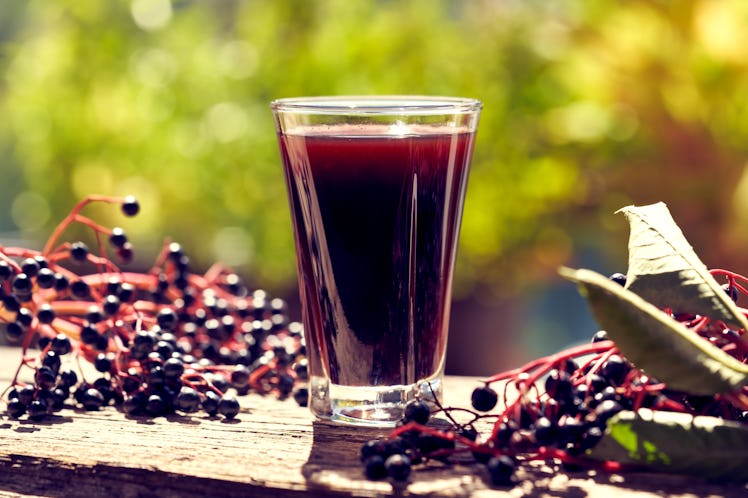Does Elderberry Work As An Immune Booster Or Is It Bunk?
You feel a cold coming and, naturally, you reach for the elderberry syrup. But does that make any scientific sense? Here's what the studies say.

With cold and flu season just around the corner, you’re taking all the necessary precautions: getting your family the flu shot, ordering the kids back to the sink to scrub their grubby hands with soap, and perhaps stocking up on…elderberry syrup? Although there’s ample scientific evidence for the rest of these precautions (go on, get your flu vaccine), the cult of elderberry syrup benefits is based more on fringe enthusiasm for a few cherry-picked studies. So does elderberry work? Are elderberry benefits all that they’re cracked up to be for preventing the flu?
Unfortunately, no. But the science says you shouldn’t give up on elderberry for colds and the flu yet. So, what is elderberry syrup good for? It doesn’t prevent illness, but it could come in handy if you do happen to get sick.
Derived from the berries of European black elder trees, the elderberry has been used to fight upper respiratory infections for centuries. As it turns out, there is some science backing up elderberry benefits for colds and the flu. They’re small studies for the most part, but there have been a few high-quality, placebo-controlled human trials — the kind required for pharmaceuticals but rarely conducted for supplements. This research shows great promise that taking elderberry syrup at the onset of symptoms may lessen their severity and help you feel better faster. The caveat: It does not support taking daily spoonfuls of elderberry syrup to prevent colds and cases of the flu.
Elder Berry Syrup For Colds
In a 2004 study, researchers recruited 64 people who’d been experiencing flulike symptoms for 48 hours or less. For the next five days, the participants took 15 milliliters of either elderberry syrup or placebo syrup four times a day, without knowing which one they’d been given. On average, those who took elderberry saw their symptoms clear up four days sooner than the people given the dummy syrup.
A second trial had people experiencing flu-like symptoms take lozenges containing 175 milligrams of elderberry extract four times a day for two days. “After 24 hours, they reported less fever, nasal congestion, muscle pain, and headaches,” says Irina Todorov, MD, an integrative physician at the Cleveland Clinic’s Center for Integrative and Lifestyle Medicine.
In another study published in 2016, Australian researchers showed that taking elderberry before an overseas flight may protect against cold viruses that can wreak havoc in a plane’s tight quarters. Over the course of 20 months, they gave 312 international air travelers either 600 to 900 milligrams of elderberry extract capsules or a placebo starting 10 days before their trip. The participants kept taking elderberry (or the placebo) until four or five days after they returned home, and they tracked any cold symptoms they experienced during or after their trip. Sure enough, more people in the placebo group got sick. They also reported harsher and longer-lasting cold symptoms than those who’d taken elderberry extract.
Based on these studies, Todorov recommends elderberry to her patients when they feel a cold or flu coming on. She also tells them to take elderberry before a situation that could readily expose them to viruses, such as an international flight. But she insists we shouldn’t take it daily on a long-term basis, as there just isn’t good evidence showing it provides ongoing protection against colds and flu.
“I do not recommend using it regularly as prevention,” Todorov says. “It’s mostly just if you have cold or flu symptoms today, then it’s worth taking until your symptoms improve.” She also cautions people who are pregnant or nursing and anyone taking immunosuppressant drugs against using elderberry.
How Does Elderberry Work?
As is the case with most herbs, the exact mechanisms for how elderberry benefits people with cold or flu haven’t been observed in human trials. However, laboratory studies offer a few clues. Some research suggests elderberry may increase the production of specific cytokines, chemicals that tell the immune system to rev up and fight off an infection. Elderberries are also chockfull of antioxidants such as vitamins A and C and various flavonoids — botanical compounds that protect cells from oxidative damage — which may help keep colds and flu under control.
“Elderberry is antiviral as well,” Todorov says. “It loosens mucus, making it easier to cough and preventing [an upper respiratory virus] from turning into pneumonia or bronchitis.”
When shopping for elderberry, Todorov suggests Sambucol, the proprietary extract that’s been studied the most. In line with the research, she suggests 15 milliliters of Sambucol syrup four times a day for adults and twice a day for children for up to five days. Or, if taking a Sambucol lozenge, she recommends 175 milligrams four times a day for adults and twice a day for kids for up to two days. If going with another brand, read the ingredients list and look for the botanical name (Sambucus nigra) along with the common name (elderberry) to ensure that it’s the right species of elderberry.
Although elderberry syrup is no substitute for a flu shot, and it won’t guarantee a cold-free winter, it may help your family get through the season with fewer sneezes and sick days.
Elderberry Syrup Benefits
- The best time to take black elderberry syrup is when you feel cold and flu symptoms coming on.
- Elderberry syrup can help lessen cold and flu symptoms and may make you suffer for less time. It’s a good way to stop pneumonia from turning into bronchitis.
- Elderberry syrup benefits do not include flu or cold prevention. If you are trying to stay cold-free with an elderberry syrup regimen, you’re barking up the wrong tree.
- If you’re looking for a brand, check out Sambucol, the extract that’s been studied the most.
This article was originally published on